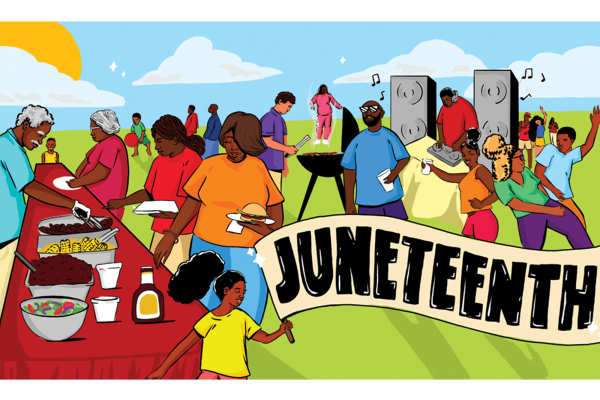THE MONTH OF June will require spiritual caregivers to take note of tensions. We begin with the celebration of Pentecost, known as the “birthday of the church,” which will undoubtedly be a day of great joy for the faithful. But later in the month, we mark the grim anniversaries of shootings at Mother Emanuel AME Church in Charleston, S.C., and Pulse nightclub in Orlando, Fla. We will celebrate people who father, and we will wrestle with complicated feelings about the fathers in some of our lives (and even contend with heteropatriarchy in our structures and theology). And we will celebrate the Juneteenth holiday while this nation still incarcerates Black bodies at disproportionate rates and refuses federal protections against voter suppression.
Pentecost invites the church to consider our Spirit-given power to share the gospel, speak with authority to all corners of the earth, and set the captives among us free. It may be that we find ourselves working for equity and liberation harder than we ever have before, and a pandemic has only exacerbated our fatigue. But hopefully this will be an opportunity to go back to the well of the Spirit and draw nourishment for our continued journey. We are not alone, and no one is expected to single-handedly carry the work. The same power that increased the church’s number by 3,000 on its first day is still with us. This, siblings, is good news, because we will need that power for the work we still must do.
June 5
A Common Tongue?
Acts 2:1-21; Psalm 104:24-35; Romans 8:14-17; John 14:8-17, 25-27
PENTECOST IS OFTEN framed as a “reversal of Babel.” We read the Genesis 11 story and conclude that God was displeased upon seeing the tower humans built. The text, however, is silent on how God felt. We only know that God dispersed humans and confused their language. We could ask, if God were displeased, then is human diversity an output of God’s displeasure? Is diversity a burden to be overcome by segregating or homogenizing ourselves? This is the dangerous conclusion South African Dutch Reformed minister J.D. du Toit and other Christians reached when they used Genesis 11 to make biblical arguments in favor of apartheid laws. How we read the text matters. What if God were actually impressed by the work humans had done, but the humans abandoned the building project because God was laying before them more challenging work?
Acts 2 describes a scene in which people proclaimed God’s deeds in various languages and they could all be understood. They were not flattened into a single language. The Roman Empire’s language is not named in the litany of tongues. God’s Spirit doesn’t privilege the center but reaches as far as the lands of each of these languages. I love the psalmist’s inclusion of all creation in the proclamation of God’s deeds. There are no barriers—God-made or human-made—to God’s embrace. This is what Paul wanted the Roman church to understand: We are empowered by the Spirit to become children of God, thus family to each other. Jesus promised there would be an Advocate who would come and help his disciples as he prepared to leave them in body, and this Advocate would be with them forever.
Pentecost can be understood as a reversal of Babel or as a return to it. I believe we are being invited to resume a communal project that we never should have abandoned. It might not be easier, but the Spirit shows us it is not impossible.
June 12
Difficult Truths
Proverbs 8:1-4, 22-31; Psalm 8; Romans 5:1-5; John 16:12-15
TRINITY SUNDAY IS an opportunity to examine the role God assumes in our lives and the many ways God is present with us. The wisdom discourse of Proverbs 8 anthropomorphizes wisdom as a woman. She was the first to be created and witnessed the creation of everything else. She rejoiced at creation and delighted in humanity, to whom she now calls. She desperately wants our attention. Wisdom, however, is difficult to listen to because she doesn’t tell us what we want to hear. Wisdom keeps us in check when we would rather be left to our own devices. I can see why Jesus, after telling his disciples some already difficult truths before he goes to the cross, says, “I still have many things to say to you, but you cannot bear them now.”
The Spirit of truth enables us to absorb all that God has to say, whether it’s comfortable or disturbing. We can be legitimately scared, but genuinely at peace. Paul encouraged the Roman church to boast of their hope in God, for hope often grows desperate in crisis. Hope in God allows us to be confident in those times. We are to resist the temptation to justify ourselves and look to God for that justification, which only comes by faith. As the psalmist reminds us, God’s majesty can be seen in all creation, and God still esteems humanity and looks to us to care for creation. We’ll need some serious help to step into such a partnership! This is the whole of trinitarian doctrine: God created us, justifies us through our faith in Jesus Christ, and constantly calls out to us, helping us to embrace truth, even when it challenges our comfort.
June 19
Our Haunted Histories
Isaiah 65:1-9; Psalm 22:19-28; Galatians 3:23-29; Luke 8:26-39
THE JUNETEENTH HOLIDAY confronts us with our nation’s shameful past and its lingering legacy. The confrontation is hardly welcome, however. “Straw man” arguments (pardon the phrase) against critical race theory are shouted from podiums at school board meetings around the country, while opportunistic politicians take advantage of this manufactured outrage. History texts are rewritten to soften the image of America’s “peculiar institution,” while books that appropriately sensitize us to the realities of racialized terror are banned. Even slower than the actualization of emancipation is our willingness to reckon with the truth.
Isaiah 65 voices the anguish of a God who desperately wants to be sought out by a people who’ve decided they can’t be bothered. After all, they’re good, religious people—what do they need to change? The Gerasenes saw their neighbor liberated from tormenting demons and responded by inviting Jesus to leave. Had they forgotten the demoniac’s torment? Were they ignorant of the story, or indifferent toward it? Perhaps receiving news of his liberation meant they’d have to painfully acknowledge the demons that had been among them all along. One wonders if the good folks in the Gerasene region were worried about what else was prime for upheaval once the most oppressed among them finally got free.
Juneteenth celebrations draw from the same well as the psalmist who refuses to be silent about God’s salvation, irrespective of how it makes others feel. “The poor shall eat and be satisfied” (Psalm 26:6). For Paul, “there is no longer slave nor free” (Galatians 3:28), nor any contrived hierarchy that deprioritizes the cries of the afflicted. In the Black church, testimony services might include someone thanking God because they woke up “clothed and in [their] right mind.” You cannot grasp the power of that statement unless you consider what it meant for the “Gerasene demoniac” and for those of us who are still tormented.
June 26
Crossing into Freedom
1 Kings 19:15-16, 19-21; Psalm 16; Galatians 5:1, 13-25; Luke 9:51-62
WHEN HARRIET TUBMAN made her escape from a plantation in Dorchester, Md., she described what it felt like when she realized she’d crossed the Mason-Dixon line to freedom in Pennsylvania: “When I found I had crossed that line, I looked at my hands to see if I was the same person. There was such a glory over everything; the sun came like gold through the trees, and over the fields, and I felt like I was in Heaven.”
“A glory over everything”—she had a beautiful way of describing her experiences. It seems that, for Tubman, crossing that line was akin to transfiguration. She had a new understanding of what God was doing with her. I sometimes wonder about the liminality of Tubman’s journey—the threshold or “between space”—and what that mixture of hope and terror must have felt like. Did she pray Psalm 16, asking for and trusting in God’s protection? What strengthened her for the journey? Our texts are full of liminality amid transition.
In what were among his last prophetic acts, Elijah calls Elisha as his successor and anoints Hazael as king, as God commanded. Elisha, ignorant of all that is before him, burns his plows and roasts his oxen, leaving all behind to follow Elijah. In Luke 9:51-62, we meet Jesus after his transfiguration but before he is “taken up.” So many rumors have been circulating about him—is this Elijah? The story progresses at a breakneck speed as Jesus is rejected in a Samaritan town and engages some potential followers. There’s an erratic tension in all of it, and you know something big is about to happen.
Times of liminality and uncertainty often reveal who we are. Paul’s admonition to the Galatian church reminds us that we’re led to liberty by love of neighbor and the Spirit’s guiding. On the other side of liminality is, hopefully, freedom. What new glories await us across the threshold?

Got something to say about what you're reading? We value your feedback!

